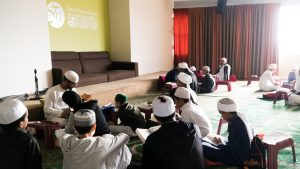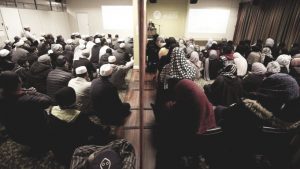Beginners’ level (one year)
This level is aimed at introducing students to the Islamic sciences at an elementary level, as well as consolidating and developing their proficiency in Arabic. In addition, it seeks to equip students to understand and assimilate the principles that will prepare them to engage the sciences more deeply at the next level.
Quranic Memorisation (Ḥifẓ al-Qur’ān)
- Memorisation of Juz ‘Amma, Juz Tabārak and the following sūrahs: al-Wāqi’ah, al-Dukhān, Yāsīn, al-Sajdah, al-Kahf and al-Baqarah.
Quranic Exegesis (Al-Tafsīr)
- Enables students to understand and assimilate the meaning of Juz ‘Amma and Juz Tabārak, as well as the following sūrahs: al-Wāqi’ah, al-Dukhān, Yāsīn, al-Sajdah and al-Kahf from Tafsīr al-Jalālayn. Students must also understand and assimilate the reasons for their revelation and the stories behind them.
Quranic Recitation (Al-Tajwīd)
- Equips students to understand the principles of Tajwīd from the book Taysīr Aḥkām al-Tajwīd, and to apply them to their recitation of the Qur’an.
Memorisation of Prophetic Narrations (Riwayah al-Ḥadīth Ḥifẓan)
- Memorisation of aḥadīth from selected books, including Nūr al-Īmān min Kalām al-Habīb al-Rahmān and Quṭūf al-Fāliḥīn min Riyāḍ al-Ṣāliḥīn.
Commentary on Prophetic Narrations (Riwayah al-Ḥadīth Sharḥan)
- Enables students to understand and assimilate the meaning of selected aḥadīth from the above books, and to learn to read them with the correct pronunciation.
Prophetic Biography (Al-Sīrah al-Nabawiyyah)
- Enables students to understand the meaning of the sīrah from the book Durūs al-Sīrah and to appreciate the greatness of the Prophet Muhammad (ṣallā Allāhu ʿalayhi wa sallam) in a way that increases their love for him.
Jurisprudence (Al-Fiqh)
- Equips students to understand and assimilate the principles of Shafi’i fiqh as contained in beginners’ primers, including Al-Risālah al-Jāmi’ah and Safīnah al-Najaḥ, and to apply them to their lives.
Memorisation of Faith and Doctrine (Al-Īmān wa al-‘Itiqād Ḥifẓan)
- The memorisation of the following: Al-‘Aqīdah al-Mujmalah and Manẓūmah al-‘Aqīdah al-‘Awām.
Faith and Doctrine (Al-Īmān wa al-‘Itiqād Sharḥan)
- Enables students to develop a clear understanding of the basic concepts and principles of ‘aqīdah in the above-mentioned books, and to become familiar with their foundations in the Qur’an and Aḥadīth, as well as the intellectual proofs for them. The course draws on commentaries of the above texts as well as others.
Explanation of the proofs of the Ahl al-Sunnah wa al-Jamā’ah (Bayān al-Adillah)
- Equips students to guard against the errors and dangers of those who are at odds with the beliefs of the Ahl al-Sunnah, and enables them to answer questions regarding the proofs of these practices.
Memorisation relating to Purification (Al-Iḥsān wa al-Tazkiyah Ḥifẓan)
- Memorisation of the poem Riyāḍah al-Ṣibyān.
Commentaries relating to Purification (Al-Iḥsān wa al-Tazkiyah Sharḥan)
- Equips students to understand the principles and counsels contained in Riyāḍah al-Ṣibyān and Bidayah al-Hidayah, and to apply them to their lives.
Dictation (Al-Imlā’)
- Provides students with the opportunity to develop the skill of taking dictation in Arabic accurately and without hesitation.
Syntax (Al-Naḥw)
- Equips students to understand the text of al-Ājrūmiyah and to develop the skill of grammatical analysis (‘irāb) at an elementary level.
Calling to Allah (Thaqāfah al-Da’wah)
- Instills in students the love of giving advice and benefiting others, as well as an appreciation of the importance of da’wah and its rank in the service of the religion.
Islamic History (Tārīkh al-Islām)
- Equips students with an understanding and appreciation of the merits and righteous actions of the Emigrants and Helpers, as well as of the four rightly guided caliphs.
Intermediate level (three years)
This level seeks to enable students to attain a deeper and more nuanced understanding of the Islamic sciences, building on the knowledge gained at the beginners’ level. It aims to instill within students knowledge of traditional Islam rooted in verified chains of transmission with the objective of equipping them to play an active role in defending Islam from attacks from both West and East.
Quranic Memorisation (Ḥifẓ al-Qur’ān)
- Memorisation of the first half of the Qur’an.
Quranic Exegesis (Al-Tafsīr)
- Enables students to understand and assimilate the meaning of the surahs from Sūrah al-Fātiḥah to Sūrah al-Anbiyā’, as well as the reasons for their revelation and the stories behind them.
Quranic Recitation (Al-Tajwīd)
- Consolidates the principles and issues relating to Tajwīd, and enables students to become accustomed to applying them by practising them.
Principles of Exegesis (Usūl al-Tafsīr)
- Introduces students to the main issues in Usūl al-Tafsīr and enables them to answer questions about them.
Memorisation of Prophetic Narrations (Riwayah al-Ḥadīth Ḥifẓan)
- Memorisation of the first half of Riyāḍ al-Ṣāliḥīn.
Commentary on Prophetic Narrations (Riwayah al-Ḥadīth Sharḥan)
- Enables students to consolidate their understanding of the meaning of selected Prophetic aḥadīth, as well as their ability to read the aḥadīth with the correct pronunciation.
Ḥadīth Methodology (Al-Dirayah)
- Enables students to understand ḥadīth terminology and to memorise examples of each category of ḥadīth.
Prophetic Biography (Al-Sīrah al-Nabawiyyah)
- Enables students to derive benefit from the Prophetic guidance and to become familiar with the chronology of events in the Prophet’s (ṣallā Allāhu ʿalayhi wa sallam)
Jurisprudence (Al-Fiqh)
- Equips students to understand and assimilate the principles of Shāfi’i fiqh and to apply them to the solution of questions as dealt with in intermediate primers, such as Al-Muqqadimah al-Ḥaḍramiyyah, and their associated commentaries.
Faith and Doctrine (Al-Īmān wa al-‘Itiqād Sharḥan)
- Provides students with the tools to appreciate the greatness of Allah and His creation, as well as to understand and assimilate the principles of ‘aqīdah at an intermediate level through the study of texts such as the poem Jawharah al-Tawḥīd and Al-Ḥikmah fī Makhlūqāt Allāh.
Purification (Al-Iḥsān wa al-Tazkiyah Sharḥan)
- Focuses on texts by al-Imām al-Ḥaddād and al-Imām al-Ghazzāli, seeking to enable students to understand the meanings of these texts and to apply them to their lives.
Dictation (Al-Imlā’)
- Ensures that students are able to take dictation accurately and avoid errors.
Syntax (al-Nahw)
- Enables students to understand commentaries on texts such as the Ājrūmiyyah and answer questions about it, as well as to engage in ‘irāb (grammatical analysis) at an intermediate level.
Morphology (Al-Ṣarf)
- Ensures that students are able to understand and apply the rules of morphology at an intermediate level.
Rhetoric (Al-Balāgha)
- Enables students to understand the meaning of rhetoric by providing examples and extracting the rhetorical meanings from them.
Public Speaking (Khiṭābah)
- Provides students with an opportunity to develop and refine the skill of public speaking, to enable them to call people to Islam more effectively.
Islamic History (Tārīkh al-Islām)
- Provides students with an understanding of the Ummayid and Abbasid Caliphates and the biographies of notable persons.
Calling to Allah (Thaqāfah al-Da’wah)
- Equips students with a consolidated understanding of the principles of da’wah as well as with practice in applying them.
Tertiary level (one year)
This level is in the process of being developed.
Specialisation / Takhaṣuṣ (2 years)
This level is in the process of being developed.




